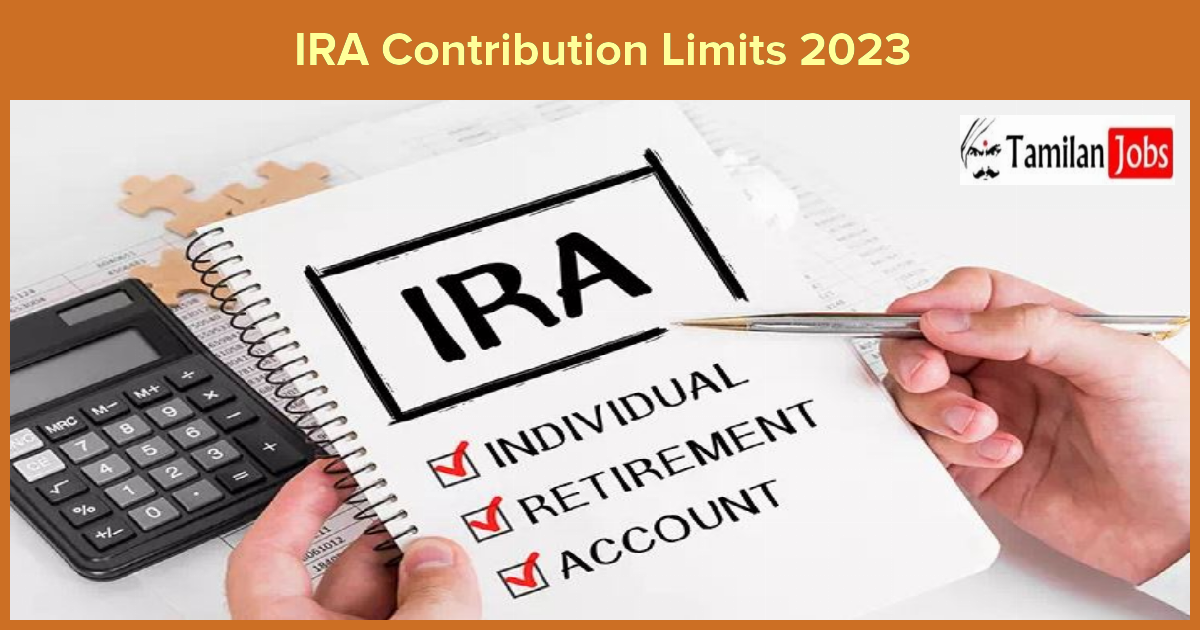IRA Contribution Limits 2023: Individual Retirement Accounts (IRAs) are an essential tool for building retirement savings, and it’s essential to keep up with the latest regulations and contribution limits. For 2023, there are some important changes to the IRA contribution limits and income deduction limits that you should be aware of to make informed decisions about your retirement savings.
IRA Contribution Limits 2023 Form – Last Date
The maximum contribution limit for IRA accounts in 2023 remains unchanged from the previous year, allowing you to contribute up to $6,000 if you are under 50 years old and $7,000 if you are 50 years or older. The deadline for contributing to an IRA for the 2023 tax year is April 15, 2024. It’s important to note that contributing to an IRA can help reduce your taxable income, which can lead to significant tax savings.

IRA Contribution Limit 2023:
The IRA contribution limit for 2023 is the same as the previous year, with a maximum contribution of $6,000 if you are under 50 years old and $7,000 if you are 50 years or older. These limits apply to all types of IRAs, including Traditional, ROTH, and SEP IRAs.
IRA Traditional Deduction Income Limit 2023:
If you contribute to a Traditional IRA, you may be eligible to deduct your contributions from your taxable income. However, there are income limits that determine how much you can deduct. In 2023, the income limits for Traditional IRA deductions have increased, with a phase-out range of $68,000 to $78,000 for single taxpayers and $109,000 to $129,000 for married couples filing jointly.
| Traditional IRA Tax Deduction Limit 2023 | ||
| Filling Status | 2023 Income | Deduction |
| Single, Head of Households, or qualifying widower | Less than $73,000 | Full deduction up to the contribution limit |
| $73000- $83000 | partial deduction | |
| More than $83000 | no deduction | |
| Married Filing jointly or qualifying Widower | Less than $116000 | Full deduction up to the contribution limit |
| $116000-$136000 | partial deduction | |
| More than $136000 | no deduction | |
| Married filing separately | Less than $10000 | Partial deduction |
| More than $10000 | no deduction | |
| Higher Tax deduction Deduction limit for Married couples | ||
| Filing status | 2023 Income | Deduction |
| Married filing jointly | $218000 or less | Full |
| $218000- $228000 | Partial | |
| $228000 or more | None | |
| Married filing separately | less than $10000 | Partial |
| more than $10000 | None | |
IRA ROTH Deduction Income Limit 2023:
If you contribute to a ROTH IRA, you won’t be eligible for a tax deduction, but your earnings can grow tax-free, and withdrawals in retirement are also tax-free. In 2023, the income limits for ROTH IRA contributions have increased, with a phase-out range of $129,000 to $144,000 for single taxpayers and $204,000 to $214,000 for married couples filing jointly.
| ROTH IRA Tax Deduction Limit 2023 | ||
| Filling Status | 2023 Income | Deduction |
| Single, Head of Households, or qualifying widower | Less than $138,000 | Full deduction up to the contribution limit |
| $138000- $153000 | partial deduction | |
| More than $153000 | no deduction | |
| Married Filing jointly or qualifying Widower | Less than $218000 | Full deduction up to the contribution limit |
| $218000-$228000 | partial deduction | |
| More than $228000 | no deduction | |
| Married filing separately | Less than $10000 | Partial deduction |
| More than $10000 | no deduction | |
Consequences of Contributing to Excess Amount in IRA 2023- Age Limitations, Withdrawal Penalty:
It’s essential to keep track of your IRA contributions to avoid contributing more than the allowed limit. If you contribute more than the limit, you may be subject to a 6% penalty tax on the excess amount each year until you remove it. Additionally, there are age limitations for contributing to IRAs. If you are over 70 1/2 years old, you cannot contribute to a Traditional IRA, but you can still contribute to a ROTH IRA if you have earned income.
IRA Contribution Limits 2023 Form
Note: Staying informed about IRA contribution limits and income deduction limits is critical to ensure that you are making the most of your retirement savings opportunities. If you have questions or need further guidance, consider consulting with a financial advisor or tax professional. With the right information and planning, you can make the most of your IRA contributions and achieve your retirement savings goals.